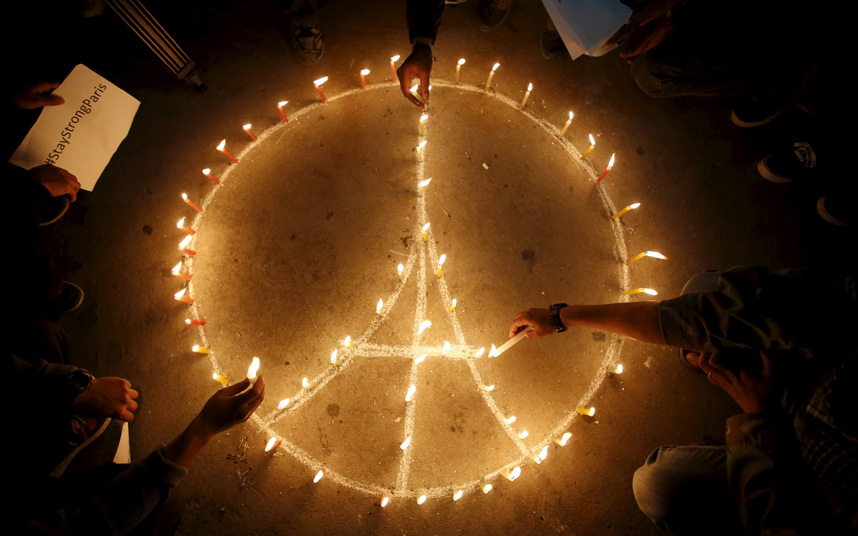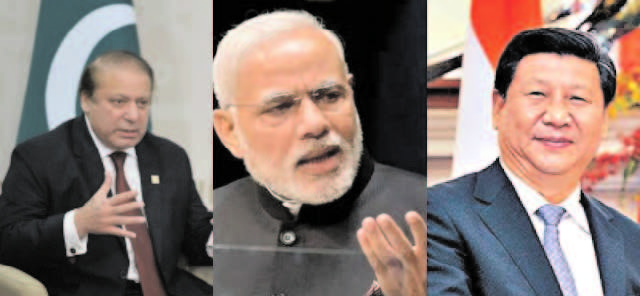
The diligently coordinated and utterly condemnable November 13 terrorist attacks in Paris killing 129 and wounding 352 innocent human beings have terrorized France and the rest of the West. The Islamic State (IS) claimed ‘responsibility’ with much alacrity and satisfaction. The previous day, IS had killed 43 and wounded 200 in Lebanon, with the Western media and Western governments hardly taking any note of that incident. In contrast, Paris 13/11 has evoked moral outrage and expressions of solidarity with France. The colours of the French flag adorned prominent buildings in many Western capitals. Looking back, Mumbai 26/11 in 2008 that killed 164 people got less international media attention and governmental responses.
Under President Francois Hollande, France has responded more or less in the same vein as the United States led by President George Bush did post-9/11. We now know that the US response under Bush was disastrous. Far from weakening, let alone eliminating terror, his Global War on Terror (GWOT) globalised terror and strengthened the terrorists especially in the WANA region. (This observation does not apply to the Indian subcontinent where the Jaish-e-Mohammed and Lashkar-e-Taiba had started carrying out terrorist attacks in the mid-1990s.) As far as the WANA region is concerned, it was the ill-conceived invasion of Iraq in 2003 and its criminally incompetent occupation based on false assumptions that created the preconditions necessary for the emergence of Jihadi Terrorism (JT). IS is only one form of JT that has emerged in that region. 13/11 Paris is only one of the acts of terror of the IS. The link between 13/11 Paris and GWOT has to be recognised. Without that recognition, it will not be possible for decision-makers to address the threat of IS and the rest of JT.
When the attack on Charlie Hebdo occurred in January 2015 in Paris, France showed a degree of willingness to look deeper into the causes of that attack. It was recognized that the deprived conditions in the suburbs inhabited by Muslim immigrants — inadequate access to education and employment – needed to be rectified, even though there was not much follow-up action.
But in response to 13/11, Hollande declared that France was at war and vowed to destroy the IS. He also stated that: Constitution will be amended to give more powers to security forces to arrest suspects; those who hold double nationality can be deprived of their French nationality if they are found involved in terrorism; the security agencies will get more personnel; and if a choice is to be made between security and liberty, France will unhesitatingly choose the former.
Hollande addressed the two houses of Parliament at the historic Palace of Versailles. His audience sang The Marseillaise, one of the most militaristic of national anthems, after he completed his address. Originally, it was composed in 1792 when Revolutionary France was threatened by the European monarchies. Napoleon replaced it by another. His nephew Napoleon III introduced another, Partant pour La Syrie (Going to Syria), to recall Napoleon’s military campaign in Egypt and Syria (1798-1801). That military campaign was a disaster.
Hollande is not, however, expected to send the army to Syria to fight the IS. He has only intensified air raids that France has been conducting since September against the IS. In fact, France had already declared war on the IS with these raids. If France did not expect any retaliation by IS, that is rather surprising.
We do not know why France was taken in by surprise. Perhaps, some pundits misled the French government. For a while, they have been theorising on the difference in approach between Al Qaeda and the IS. The former attacks the ‘far enemy’ while the latter attacks the ‘near enemy’ and captures territory.
It is not difficult to figure out why Paris was attacked. IS has suffered much under Russian air raids starting from 30 September. It has lost territory in Sinjar, cutting the road connection between Mosul, its most important territorial possession, and its capital at Al Raqqa. It brought down a Russian airliner carrying Russian tourists from Sharm al-Sheikh in Sinai. As Turkey has tightened its border controls, it is difficult for foreign volunteers wanting to join the IS to get into Syria. It was necessary to keep them occupied and the IS decided to make use of its assets in Belgium and France. To argue that the IS carried out the attacks because it has visceral hatred for Western values is to miss the central point. IS has that hatred, but essentially 13/11 was an act of vengeance against France and others who have been bombing the IS. Hence, there was good reason to anticipate an attack as IS lacks aircraft to bomb Paris.
The day after the Paris attacks, Vienna once again hosted a meeting of the International Support Group on Syria (ISGS). The first meeting had been held earlier on 30 October. The role of Basher al Assad came up once again. The US and its allies want him to exit from power as early as possible. But they have realized that, with support from Russia and Iran, Assad is able to cling on to power. France has now accepted that the primary focus should be on destroying the IS and not on removing Assad. Thus, the Western opposition to Assad has become weaker. Yet, there is no clear agreement on this matter and that will come in the way of progress towards a negotiated solution. Turkey and Saudi Arabia remain adamant in their demand for Assad to step down. The US has realised the impracticality of taking that line, and is trying hard to persuade Saudi Arabia and Turkey in this regard. It might or might not succeed. Essentially, the US and its allies are demanding Assad’s exit without being able to do anything to enforce it. They lack the necessary political clout as well as military means.
The ISGS succeeded in coming out with a statement by concealing internal differences through the use of clever words. It was decided that the UN will arrange for a meeting by January 1, 2016 between the Syrian government and its opposition to start the political process. The ISGS has also supported a cease-fire between the Assad regime and its non-terrorist opponents. The terrorists have to be destroyed and Jordan was tasked with listing the terrorists to be destroyed by consultations among the concerned intelligence agencies. This will not be an easy task as deep differences remain.
It will not be realistic to expect much progress as the ground realities prevent it. Even the so-called non-terrorist opposition is not prepared to deal with Assad. He has also said that the political process cannot start till the terrorists are defeated. The prospects for any result-producing meeting are bleak. To talk of the writing of a constitution and the holding of an election is frankly irresponsible. All that Vienna 2 has done is to consolidate the opposition to the IS and that too up to a point. Conference rhetoric has to be taken with a pinch of salt.
At the G-20 summit held on 15-16 November at Antalya, Turkey, Paris 13/11 and the IS dominated the discussions. Obama smiled at Putin when they two for 35 minutes, in contrast to their previous meeting in New York in September when Obama’s body language was markedly hostile. He has realised that Syria cannot be addressed without Putin’s cooperation. Putin has come out of the isolation imposed on him after he annexed the Crimea in early 2014. The US and Russia will coordinate operations against the IS, though their differences on Syria remain and the US cannot easily forget that rebels supported by it were bombed by Russia. Russia has not given its word that it will stop bombing these rebels.
As a result of Paris 13/11, there is a backlash against refugees from Syria and elsewhere. When refugees started coming in large numbers through Greece, Europe led by German Chancellor Angela Merkel welcomed them. Even before 13/11, resistance had built up against refugees. 13/11 has made it more difficult to get people in Europe to accept Syrians and others. There is fear, not necessarily justifiable, that terrorists might come in as refugees. In the US, Congress has passed a resolution suspending Obama’s plan to take in 10,000 Syrians next year. 47 Democrats broke with the President and voted for the resolution.
Paris 13/11 has provoked a debate among the candidates running for the US presidential election next year and Obama will come under increasing pressure to change his policy on Syria. He has categorically stated that he would not send ground troops to Syria. But what will he do if the US were to be attacked? An IS video has threatened to attack Times Square in New York, but it might not be a serious threat. The intention may be to cause panic. The IS may not have the capability to carry out any operations in the US.
The IS likely to be there after Obama leaves office. Some military analysts have argued that with 500 air sorties a day the US should prepare the ground for Arab armies to fight with the IS. Retired General Tom Mclnerney has sharply criticised Obama and argued the case for carpet bombing so that nothing is left moving on the road between Mosul and Al Raqqa. We do not know how Obama’s successor will act.
The Security Council’s unanimously passed Resolution 2249 calls upon Member States that “have the capacity to do so to take all necessary measures in compliance with international law” to “redouble and coordinate their efforts to prevent and suppress terrorist acts” committed by IS, Al Nusra, Al Qaeda and others. The weakly worded resolution does not invoke Chapter 7 and there is no obligation to act. Moreover, the division within the Council was apparent when the Russian draft urging cooperation with the Syrian government in fighting terrorism had to be withdrawn.
Are we witnessing the beginning of the end of the IS? Hardly. IS can be brought down only by ground attacks on a major scale and there are no signs thereof yet. Neither France nor the US is in a position to send ground troops. Only Assad and his ally Iran can send ground troops, but the IS might be able to resist them at least for a while. The Arab powers are not actively fighting the IS. Saudi Arabia stopped its bombing campaign in September, Bahrain in February, the UAE in March, and Jordan in August. That they are busy in Yemen fighting an unwinnable war might be only part of the reason for their reluctance to fight the IS.
In short, the IS has succeeded in spreading panic in the West. Brussels remains shut down as Belgium has reasons to fear a big attack. On the other hand, the adversaries of IS have redoubled their determination to intensify air raids and their efforts to weaken it. But there is no prospect as of now of any ground operations against the IS. The ongoing ground operations by Assad’s army assisted by Iran and the Hezbollah are not sufficient to decisively defeat the IS.
Views expressed are of the author and do not necessarily reflect the views of the IDSA or of the Government of India





Be the first to comment